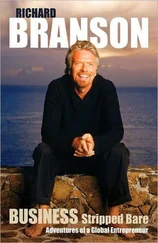I suppose the secret to bouncing back is not only to be unafraid of failures but to use them as motivational and learning tools. Setbacks are discouraging, but you should always try to channel that feeling into positive action. The key to Virgin’s continuing success has been this simple idea: when we get something wrong, we try to understand why and quickly make a change. Then we focus on what works and take it to the next country or industry or sector.
There’s nothing wrong with making mistakes as long as you don’t make the same ones over and over again. Conduct a thorough postmortem and use the findings to your advantage to make sure you get it right the next time around.
THE CUSTOMER’S ALWAYS RIGHT
Except when he’s wrong
What to do when an angry customer calls and asks, unreasonably, that your company redo their costly order? If you are an entrepreneur launching your first venture, you might be tempted to fall back on the common misconception that ‘the customer is always right’ and make a decision that will pull funds from your hard-earned war chest.
But in my experience, going along with the crowd is rarely a good choice. The expression about customers’ infallibility was coined in the early 1900s by Henry Gordon Selfridge, the founder of the eponymous London department store. It has endured because it sounds wonderful to marketers, but most established companies have learned from experience that it is way too all-encompassing to apply in everyday business. In truth, the customer is only right most of the time – after all, they’re only human.
I once wrote, ‘since your employees are your brand ambassadors, their needs should come before your customers’. That doesn’t mean that your customers’ opinions aren’t important, but simply that you should not build your customer service system on the premiss that your organisation will never question the whims of your clients.
No matter how well you run your company, there are always going to be a few chronically unhappy customers who cost more to maintain than to lose. One of my heroes in the aviation business is Herb Kelleher, the legendary founder of Southwest Airlines. There are many wonderful stories about Herb but I have always loved the one about the woman who was one of the low-cost carrier’s most frequent fliers – even though she constantly complained about the service. The more she flew, the more she complained, until, finally, Southwest’s head of customer relations sent one of the woman’s outpourings to Herb, with a despairing note that read, ‘This one’s for you’.
Herb’s response to the customer was brief: ‘Dear Mrs X, We will miss you. Love, Herb’.
No one is sure whether she ever flew with Southwest again, but she never sent them another nasty letter. What’s more, the customer service staff probably heard this story within hours and you can only imagine what a boost it was to their morale.
The irony is that many entrepreneurs think that they are upping their company’s level of customer service by pursuing a ‘the customer is always right’ approach, when in fact they end up doing quite the opposite, damaging relationships between customers and staff. If you take away your employees’ ability to negotiate on your company’s behalf, some will end up at your customers’ beck and call – even when they know of a better way to resolve a dispute.
This is an especially important issue for entrepreneurs introducing an innovative product or service to a market. Since creativity and game-changing innovation are two of Virgin’s most important brand values, we are aware of the risks involved. One is that no matter how dissatisfied some people may be with the product or service they are using, change is anathema to them. If you are introducing something that’s radically different, it’s important not to confuse these reflexively negative reactions to change with real rejection.
Try to prepare your customer service staff for what’s coming by looking at your product-offering from the customer’s perspective. Keep in mind that consumer expectations are severely limited by the scope of their past experiences – most customers cannot tell you exactly what they want. When we started Virgin Atlantic Airways, no potential customers ever said that they’d like to see a new airline offering video screens at every seat or on-board massages. Why? Simply because no other airline had ever provided such things! Will your customers have trouble recognising the upside of the unfamiliar product or service you are offering? What problems can you anticipate?
When clients start contacting your customer service team, use their feedback and your team’s insights to understand why some people are having trouble adapting to the change. Look for creative responses and solutions, which may involve anything from an informative marketing campaign to additional technical assistance.
The key to providing great customer service is for your management team to recognise the true worth of your frontline staff, the most talented of whom are expert negotiators with deep understanding of interpersonal relationships. Make sure that they have the tools they need to exercise those skills – that they all have the information they need and they can work with real autonomy to find fair resolutions to the issues that come up. (No scripts!)
There is no maxim that sums up our attitude to customer service as neatly as Selfridge’s. Over forty years of launching new products and services, we have always gone to great lengths to listen very carefully to what our customers think they want and then set about giving them something that is often very different, but always a little better.
If your business proposition is innovative, your ultimate goal has to be ‘The customer always thinks that weare right’.
Build it don’t gild it
The conventional wisdom at business schools is that you stick with what you know. Of the top twenty brands in the world, nineteen ply a well-defined trade. Coca-Cola specialises in soft drinks, Microsoft in computers, Nike in sports shoes and gear.
A glaring exception in this list is Virgin – and the fact that we’re worth several billion dollars really bothers people who believe that they know ‘the rules of business’ (whatever they are). We’re the only one of the top twenty that has diversified into a wide range of business activities, including airlines, trains, holidays, mobile phones, media, the Internet, financial services and health care.
I am proud to be able to say that we have created more billion-dollar companies in more sectors than anyone else.
Between 2000 and 2003, Virgin created three new billiondollar companies, all from scratch and in three different countries. Virgin Blue (now Virgin Australia) took 35 per cent of the aviation market and reduced fares dramatically. Virgin Mobile became Britain’s fastest growing network. Virgin Mobile in the United States was one of the country’s fastest growing companies ever, private or public.
As a result of this diversification, Virgin has been able to weather the storm of the global recession that began in 2008. Our risks are spread over many companies, industries and countries; and the failure of one will not bring down the whole group.
Why, then, are business teachers telling young entrepreneurs to stick to what they know, rather than advising them to imitate a company like Virgin?
Because they should. The Virgin brand came into existence gradually, with each forward step reflecting what I was fundamentally interested in. And, to my own surprise, it wasn’t publishing magazines, as I’d originally thought; it wasn’t even music. My driving force, I realise now, was finding new ways to help people have a good time – ideally, in places where they were least expecting it. Such as airports.
Читать дальше












